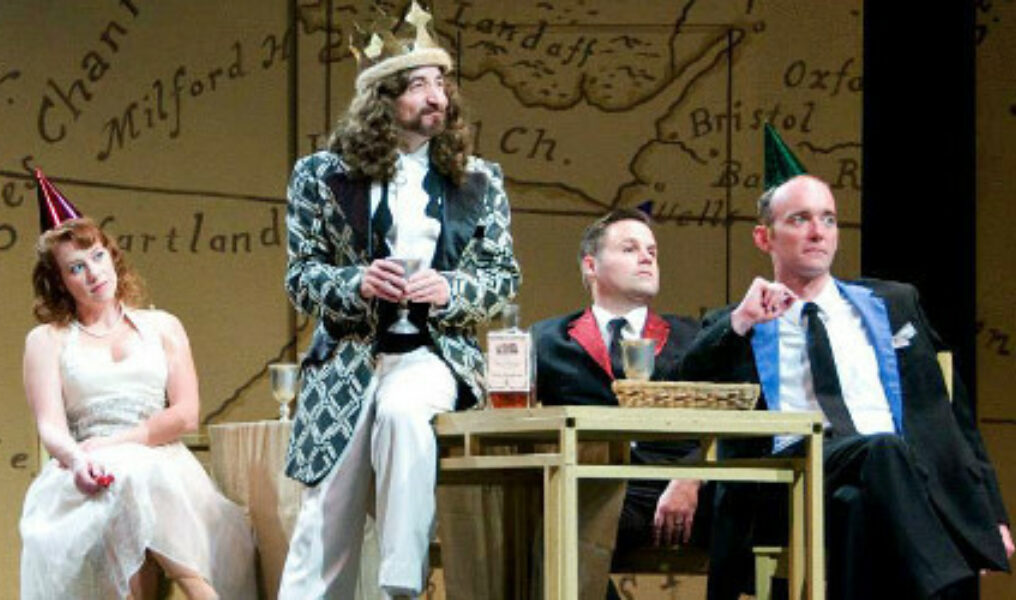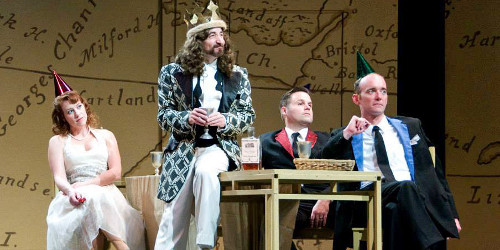By John Quinn
William Shakespeare's "The Life and Death of King John" is not a bad play, but it is a difficult one. John Neville-Andrews, adaptor and director of the Michigan Shakespeare Festival's production, calls it "convoluted and intricate." Indeed.
The plot is somewhat scattershot; a profusion of characters come and go so rapidly you can't tell the players even with a scorecard – er, program. But it's notable that, while "John" is considered one of nine English history plays Shakespeare wrote in the 1590s, it is arguably the least historical. Mention "King John" to an American and, true to his high school education, he will snap back, "Magna Carta, 1215!" Shakespeare glides right over that event because he was a consummate spin doctor – er, "political strategist." He would happily write about a usurping king but an ineffective king didn't fit the narrative.
Disputed succession is the underlying theme of all of Shakespeare's history plays. As it became obvious that Elizabeth, the "Virgin Queen," would have no heirs of the body, the citizens feared that challenges to the next monarch might lead to civil war. Shakespeare makes the artistic case as how devastating that would be by recalling England's tumultuous past. The reign of John, son of Henry II, was one of the most tumultuous.
The familial relationships in House Plantagenet is crucial in understanding the plot of "King John," and MSF has graciously provided a family tree in the program. As briefly as possible, then: Henry, King of England and Duke of Normandy, created an empire by marrying the richest heiress in Europe, Eleanor of Aquitaine. Their combined holdings in France rivaled the French king's, a situation that led to chronic scheming and bloodshed between the two countries.
Upon Henry's death the crown passed to his eldest surviving son, Richard Lionheart. Richard died childless in 1199. The crown should have passed to his brother next in line, but Geoffrey was already dead. Ah, but Geoffrey HAD a son, and by the still-evolving rules of legal succession, young Prince Arthur should have been his uncle's heir. But Uncle John, with backing from English barons, jumped the line, much to the chagrin of the French, who wanted the Breton-raised boy as king.
And so we move to "The Life and Death of King John." The French ambassador (David Blixt), in the name of his sovereign, Philip II, demands that John hand the crown to his nephew Arthur (Dominic Redman) or face the consequences. John refuses; war is inevitable. But another disputed succession comes into play as two brothers seek arbitration in an inheritance. Queen Eleanor (Amy Montgomery) sees her dead son's semblance in the elder brother and proclaims that Philip Faulconbridge (Alan Ball) is actually Richard Lionheart's illegitimate son. Philip gives up his claim and swears fealty to John. The bastard is, in effect, the reincarnation of the late king and "hero" of "King John." The fact the character is entirely fictional didn't stop Shakespeare from writing him some rousing speeches and daring deeds. Frankly, John isn't hero material. It was not for nothing that one of his nicknames was "Softsword."
Through the course of the play, John manages to alternately attract and repel the French, the Church, his own barons, and pretty much everyone who comes his way. Things come to a head when Prince Arthur turns up "missing."
John Neville-Andrew's performance script has two strong advantages over the original. It condenses Shakespeare's five acts into a fine-tuned, lean script that runs about two hours, yet the story is so strong there is no sense that anything is missing. Secondly, the director can choose the themes upon which he will focus. We are challenged to answer: If a king rules by divine right, when is it "right" to depose a king? Further; what legitimacy exists in a government whose authority rests on the principle, "Might is 'right?'"
Wonderful things can happen when the right focus is brought to bear on a text. In "King John," it is the raw power the flows between opposite poles: Eleanor of Aquitaine, mother of John, and Constance, Heiress of Brittany, the mother of Arthur. As marvelously played by Amy Montgomery and Janet Haley, the women are raw forces of nature; their individual battles on behalf of a son the catalyst of the drama.
The play, however, is not complete without a strong actor to portray the weak monarch, and Paul Riopelle serves handsomely. His John is an opportunistic mama's-boy, devious and dishonest. In a remarkable change of emotion, Riopelle turns the audience's distain to sympathy as he leads us through Johns' slow, agonizing death.
The cooperation between director and costumer has resulted in an interesting effect. Although cut and tailoring resemble early 20th century fashions, Renae Skoog's designs take them to extremes. The costumes do not define a particular time, yet they do reflect a particular character. Thus Louis, the Dauphin (Caleb Probst) sports a purple, satin-finished Zoot suit better suited to a pimp.
And costuming is a dead give-away that Neville-Andrews doesn't look at these characters in the same light as Shakespeare did. Far from heroic – in the modern sense – Alan Ball's Falconbridge is taut, menacing and almost jingoistic. How inspired of director and costumer to make him look like a film noir hit man. What an insightful commentary of the times: nobility as thugs and thieves!
REVIEW:
'King John'
Michigan Shakespeare Festival at Potter Center's Baughman Theatre on the campus of Jackson Community College, 2111 Emmons Road, Jackson. Plays in repertory through Aug. 9. 2 hours, 10 minutes. $12-36. 517-796-8600. http://www.michiganshakespearefestival.com











